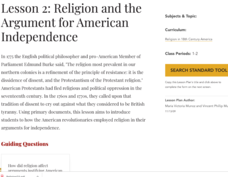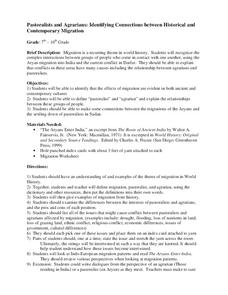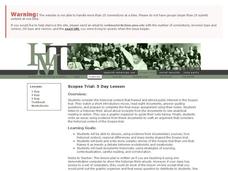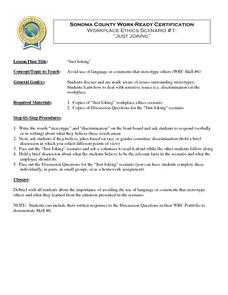National Endowment for the Humanities
Lesson 1: The First Great Awakening
High schoolers examine the First Great Awakening and how it affected religious belief in colonial America. They read and analyze primary source documents, explore various websites, and write a five-paragraph essay examining the beliefs...
National Endowment for the Humanities
Lesson 2: Religion and the Argument for American Independence
Young scholars examine how religion affected arguments justifying American independence. They read and analyze primary source documents, and write an essay analyzing how Americans used religious arguments to justify revolution against a...
National Endowment for the Humanities
How to Win a World War
High schoolers are have begun to learn the art of diplomacy with each other, but do they understand how diplomacy works at a global level? The second in a series of four lessons, guides scholars in evaluating primary sources. The why...
University of Nebraska
Why Do I Want All This Stuff?
How do advertisers influence consumers? The big idea here is that once consumers understand the factors that influence their desire for a product or service, they are better able to consider substitute and/or complementary products.
National Endowment for the Humanities
The Victor's Virtue: A Cultural History of Sport
Pupils explore the meaning of the ancient Greek word aretê and the place of virtue in historical athletic competition and modern sports. They begin by reading an informational text on the goal of sports in education, and then evaluate...
US National Archives
The Home Front: How Did People Prepare for the War at Home?
Wars have a profound effect not only on a country's soldiers, but also on the everyday lives of its citizens. Invite young historians to discover how Britain prepared for the second World War by analyzing a series of government posters...
Curated OER
Pastoralists and Agrarians: Identifying Connections between Historical and Contemporary Migration
Pastoralists and agrarians, livestock raisers and farmers. Using the conflict in Darfur as a lens, class members investigate the conflicts that arise when these groups are forced to migrate from one area to another.
Historical Thinking Matters
Scopes Trial: 1 Day Lesson
Why did many Tennesseeans support the 1925 Butler Act, which forbade the teaching of evolution? Using several primary source documents and a brief video clip, your young historians will draw connections between the broader historical...
Historical Thinking Matters
Scopes Trial: 5 Day Lesson
Did Scopes violate the Butler Act? Why did so many Americans follow the Scopes trial? See analytical reading in action with a fantastic five-day lesson plan in which class members consider the historical context that provoked public...
BW Walch
Vending Machine Bans Increase in Schools Nationwide
Does a ban on vending machines infringe on student rights, or do school officials have an obligation to monitor foods sold on school grounds? Your class members will explore the educational, health, and financial issues related to...
Achieve The Core
Linda R. Monk, Words We Live By: Your Annotated Guide to the Constitution - Grade 8
“We the people . . .” Thus begins the Preamble to the Constitution. Using a close reading approach, class members examine an excerpt from Linda Monk’s article that traces how the interpretation of these words has evolved. Some of your...
Miama-Dade County Public Schools
Patriot Day September 11, 2011
While many of our learners may recognize the date of September 11, 2001 in the United States, most will not be able to personally recall what transpired. On Patriot Day, introduce your young learners to the events, aftermath, and...
Center for Literacy and Disability Studies
GDP and Fiscal Policy Monopoly
Using the classic game of Monopoly and a revised set of rules in this resource, your class members will discover how GDP is calculated and practice enacting expansionary or contractionary fiscal policies. What a great way to learn about...
Federal Reserve Bank
Keep the Currency
Each day, people throw currency away in different ways because of a lack of financial knowledge. Introduce your learners to the importance of financial literacy and assess their understanding of banking and personal finance.
North Carolina Civic Education Consortium
The Nineteenth Amendment
Beginning with an exercise of favoritism to engage learners, progressing through image and primary source analysis of the Nineteenth Amendment and the Seneca Falls Declaration, and culminating in a look at a political cartoon called...
My Career Space
Just Joking
After reading a workplace ethics scenario regarding an employee who makes racially insensitive comments, your learners will discuss how language that stereotypes others is discriminatory and never "just joking."
Speak Truth to Power
Jamie Nabozny: Bullying: Language, Literature and Life
Class members identify bullying in contemporary texts and role play how they might change those scenes to examples of anti-bullying. They then re-define their initial definitions of bullying and discuss what they would like to see as...
Carolina K-12
The Cuban Missile Crisis
This is the perfect introduction to the Cuban Missile Crisis for your young learners. The lesson includes an engaging mock air raid, in-depth discussions, audio of President Kennedy's speech to the nation, and an event overview.
Consulate General of Ireland
St. Patrick's Day - Lá Fhéile Pádraig
Youngsters use their imaginations and the story of St. Patrick to design original artwork for the holiday, by portraying where they think St. Patrick would have visited in the United States or illustrating what St. Patrick's Day means to...
North Carolina Consortium for Middle East Studies
Journey of Reconciliation, 1947
After examining the Jim Crow laws and reading primary source materials about the 1947 Journey of Reconciliation, class members create historical markers that honor riders and their journey.
Federal Reserve Bank
Measuring the Great Depression
Young historians examine the cost of goods and services through the Consumer Price Index (CPI), output measured by Gross Domestic Product (GDP), and unemployment measured by the unemployment rate to gain an understanding of the economic...
NIOS Download
The Harappan Civilization
The Harappan Civilization, also known as the Indus Valley civilization (2600 BC-1900 BC), is the focus of a resource packet that details the rise and fall of a culture that existed in India during the Chalcolithic period of history.
Center for Civic Education
Becoming a Voter
What are the requirements to register to vote in the United States? Young citizens evaluate this process by working with handouts, informational texts, discussion, and research, as well as complete a sample voter registration form.
Center for Civic Education
Becoming an Informed Voter: Creating Initiatives
Continuing from a previous lesson on how to read and analyze proposed legislation on election ballots, your class members will now practice writing up their own proposals for a new school rule or local ordinance that will be discussed...

























